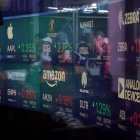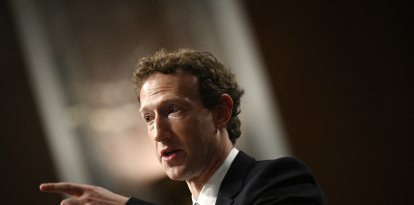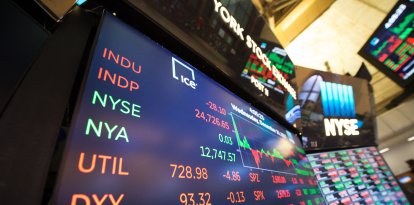Market plunges over recession fears and tariff uncertainty
Concerns about the economy have been mounting over the past month.

Traders at the New York Stock Exchange in a file image.
On Monday, Wall Street saw a day of intense losses that compounded a three-week selloff, driven by growing fears of an economic recession and uncertainty generated by the new administration's tariff policy. The Dow Jones Industrial Average plunged 781 points, equivalent to 1.8%, while the S&P 500 lost 2.5%. The tech-heavy Nasdaq Composite, suffered the biggest drop among the major indexes, falling 3.7%.
From its recent highs, the S&P 500 has lost 9.1% since Feb. 19, approaching the 10% threshold that Wall Street considers a correction. The Nasdaq, meanwhile, has fallen 14%, while the Russell 2000 index, which groups small-cap companies, has dropped 18%. Losses accelerated as the day progressed, reflecting growing risk aversion among investors.
The group known as the "Magnificent Seven," which includes tech giants such as Tesla, Alphabet, Meta and Nvidia, led the declines. Tesla plunged 13%, heading for its worst day since 2020, while Alphabet, Meta and Nvidia, the latter a favorite of the artificial intelligence boom, lost about 5% each. Palantir, another stock popular with retail investors, plunged more than 10%. The move marked an abandonment of recent bull market stars in favor of assets considered safer.
Economic fears and tariff policy
Concerns about the economy have been mounting over the past month. Initially, weak economic data, interpreted as a reaction to fluctuations in tariff policy, set off alarm bells. These concerns were intensified by recent statements from Washington. On Friday, Treasury Secretary Scott Bessent said in an interview with CNBC that the economy could face a "detox period" due to cuts in government spending driven by the new administration.
On Sunday, President Donald Trump, in an interview with Fox News, did not rule out the possibility of a recession, calling the current situation a "transition period." "What I have to do is build a strong country," Trump said. "You can't really watch the stock market," Trump said.
Goldman Sachs reacted to this uncertainty by cutting its economic growth forecast, citing the potential impact of tariffs. Sam Stovall, chief investment strategist at CFRA Research, described the situation as a "manufactured correction," arguing that it is driven primarily by the response to the administration's tariff threats and their potential effects on the economy.
Signs of caution on Wall Street
Market indicators reflect growing nervousness. The CBOE volatility index, known as investors' "fear gauge," reached its highest level since December. Bitcoin, often seen as a risky asset, dipped below $80,000, while yields on Treasury bonds declined, signaling a search for a safe haven by investors. However, the S&P 500's declines were partially cushioned by a rotation into defensive sectors with stable earnings and dividends, such as Procter & Gamble and Johnson & Johnson, which rose 1% each.


























